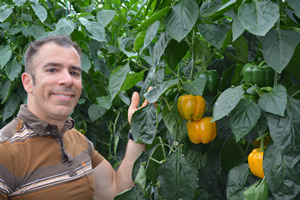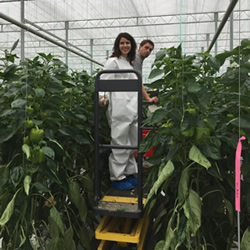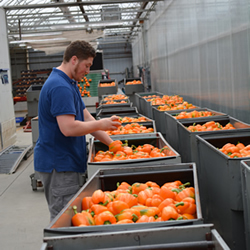Seeding Food Innovation - Awarded Project 2019
NextGen Amplified Sustainable Agriculture (NASA). It's About Space
Project Description

By 2050 some forecasts show global food demand increasing by 60%. To mitigate significant risks of global malnutrition, hunger, and conflict; food production needs to become more efficient and sustainable. Controlled Environment Agriculture (CEA) can produce higher yields at reduced spatial and environmental footprints. This control improves management of key elements like water, nutrients, and nutritional outcomes. These advantages come with a cost however; energy is among the greatest of these. Modern greenhouses and vertical farms can have significant thermal management requirements, and increasingly, very large electricity demands.
This new project is being advanced to radically rethink how CEA should be developed, built, and implemented at small scales, large scales, and worlds beyond our own. The groundbreaking model-and-maker platform will transcend existing paradigms that historically may have constrained CEA to specific locations, configurations, scales, or socioeconomic class. Outcomes from this program are aimed at: 1) transforming the energy efficiency, resiliency, and sustainability of CEA operations at all scales, 2) increasing global access to the advantages of CEA, and 3) growing and empowering the next generation of amplified agriculturalists.
Food Innovation

This will be accomplished through a powerful model that is capable of simulating the transient climate inside a greenhouse or vertical farm; designers will be able to experiment with how to optimize the delivery of this environment. Typical fundamental variables include building shape and material, temperature, light, and irrigation. Innovative modeling efforts will also be used to investigate how cleaner, more sustainable energy systems can be developed to power and thermally manage the new growing spaces. The first applications of the model will be to investigate the potential for efficiency improvement in large established commercial growing operations.
Outcome

Extending lessons from this work, completely new growing environments will be imagined for three different remote locations, Kuglugtuk Canada, Syansu India, and Angas Australia. The simulation tools developed through this research will enable investigators to design new growing spaces and corresponding energy systems suitable for these very challenging and different locations. Optimum designs for each location will then be fabricated at lab scale with advanced additive manufacturing (AAM) “3D Printing” techniques. They will then be tested in conditions that mimic each location. Finally, through partnership with Windsor Essex County District School Board, students will be educated about the merits and requirements of controlled environment agriculture. These students will 3D Print and test their own designs for various different environments.
Grantees:

Dr. Rupp Carriveau
Rupp Carriveau is the Founder and Director of the Environmental Energy Institute and Co-Director of the Turbulence and Energy Lab at the University of Windsor. His research activities focus on Energy Systems Futures and Next Generation Food Production. Dr. Carriveau serves on the Editorial Boards of
» More Info

Dr. David S-K Ting
David S-K. Ting researched on Combustion and Turbulence, followed by Convection Heat Transfer and Fluid-Structure Interactions, prior to joining the University of Windsor. Dr. Ting is the founder of the Turbulence & Energy Laboratory and a professor in the Department of Mechanical, Automotive and Materials
» More Info

Dr. Jill Urbanic
Dr. (Ruth) Jill Urbanic is a Professor in the Department of Mechanical, Automotive, and Materials Engineering at the University of Windsor. Her research focuses on advanced process design and manufacturing technologies, with a focus in process planning for machine tool and robotic based additive manufacturing
» More Info

Dr. Xiuming Hao (Agriculture and Agri-Food Canada)
Dr. Xiuming Hao is a senior research scientist with Agriculture and Agri-Food Canada (AAFC) at Harrow Research and Development Centre in Harrow, Ontario. He holds a PhD in plant physiology from University of Guelph and an MSc in computer control systems from Wayne State University. Dr. Hao has been involved in
» More Info

Mr. James Dyck (Ontario Ministry of Agriculture, Food, and Rural Affairs)
James Dyck is the Engineering Specialist for Crop Systems and Environment with the Ontario Ministry of Agriculture, Food and Rural Affairs (OMAFRA), based in Vineland Ontario. James was raised on a cash crop and hog farm in the Niagara Region, and completed his Mechanical Engineering degree at the University of
» More Info

Ms. Niki Bennett (Ontario Greenhouse Vegetable Association)
Niki Bennett is the Science Coordinator with the Ontario Greenhouse Vegetable Growers (OGVG). Niki has been with OGVG since 2014 and oversees research projects on behalf of over 200 member-greenhouses who grow cucumbers, peppers and tomatoes in Ontario. Niki is also active in seeking out crop protection
» More Info

Mr. Lucas Semple (Under Sun Acres)
Mr. Lucas Semple, P.Eng., M.A.Sc., is the General Manager of Under Sun Acres; a bell pepper production facility with 50 acres of growing area under glass. Mr. Semple has a background as a consulting engineer and is a registered professional engineer in the Province of Ontario. He obtained Bachelor’s and Master’s degrees
» More Info

Mr. Stephen Fields (Windsor Essex Catholic District School Board)
Stephen Fields has been the Communications Coordinator at the Windsor-Essex Catholic District School Board since June of 2014. His responsibilities include public relations, marketing and promotions, and media relations. Prior to joining the school board he spent seven years as a Research Communications Officer in the
» More Info

Dr. Matt Davison
Matt Davison is a Professor in the School of Mathematical & Statistical Sciences at Western University, where he has served as Dean of Science since July 2018. Matt has been a faculty member at Western University since 1999, and earned a PhD in Applied Mathematics from that institution in 1995.
» More Info

Dr. Lindsay Miller
Lindsay is an adjunct professor in Civil Engineering and Instructor in Technical Communications at the University of Windsor. Lindsay has notable research experience in energy systems with a focus on renewable energy, energy finance, and the environmental and economic impacts of energy technologiess
» More Info
[Back]